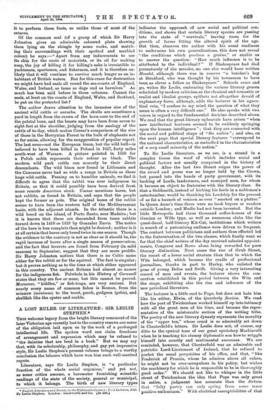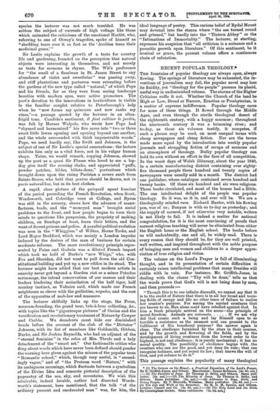Sir Leslie explains the growth of a taste for country
life and gardening, founded on the perception that natural objects were interesting in themselves, and not merely as texts for sermons in rhyme. The Wit's preference for "the smell of a flambeau in St. James Street to any abundance of violet and sweetbrier" was passing away, and stiff plantations and parterres were retreating before the gardens of the new type called "natural," of which Pope and his friends, far as they were from seeing landscape beauties with modern eyes, were active promoters. The poet's devotion to the innovations in horticulture is visible in the familiar couplet relative to Peterborough's help when he "now forms my quincunx and now ranks my vines,"—a passage quoted by the lecturer in an ultra. frigid tone. Candide's sentiment, ii fast milliner is jardin, was felt by Horace Walpole, who wrote how Pope had "rhymed and harmonized" his five acres into "two or three sweet little lawns opening and opening beyond one another, and the whole surrounded with thick impenetrable woods." Pope, we need hardly say, like Swift and Johnson, is the subject of one of Sir Leslie's special annexations: the lecture exhibits him only as a vital force, not in his vulgar human shape. Tame, we would remark, copying Johnson, showed up the poet 1113 a quasi Sir Plume who loved to see a lap- dog give itself the rousing shake, and appreciated "puffs, powder patches, bibles, billets-doux," portraiture which brought down upon the rising Parisian a severe snub from Sainte-Beuve, who held that genius should be drawn, not in puris natural/bus, but in its best clothes.
A rapid, clear picture of the guieguid agunt homines of the period preceding the French Revolution, when Scott, Wordsworth, and Coleridge were at College, and Byron was still in the nursery, shows how the advance of manu- factures, trade, and the "moneyed man" brought social problems to the front, and how people began to turn their minds to questions like pauperism, the propriety of making children, on Sundays at least, learn their letters, and the want of decent prisons and police. A parallel political evolution was seen in the " Whiggism " of Wilkes, Horne Tooke, and Lord Mayor Beckford, which was mainly a London impulse induced by the desires of the man of business for certain moderate reforms. The more revolutionary principle repre- sented by Paine and Godwin was a diluted French import which took no hold of Burke's "new Whigs," who, with Fox and Sheridan, did not want to pull down the old Con- stitutional building and put up a new edifice in its stead. The lecturer might have added that our beat modern artists in anarchy never got beyond a Gordon riot or a minor Peterloo scrimmage, the inbred conservatism of our masses and their leaders hindering their assimilation of the half tiger, half monkey instinct, as Voltaire said, which made our French neighbours so clever with the guillotine, noyades, and the rest of the apparatus of mob-law and massacre.
The lecturer skilfully links up the stage, the Press, museum-founding, the grand tour, brie:a-brae collecting, &c., with topics like the " gigantesque pictures" of amiss and the versification and revolutionary treatment of Nature by Cowper and Crabbe. We decedents must hide our diminished heads before the account of the club of the " Dictator " Johnson, with its list of members like Goldsmith, Gibbon, Burke, and Sir Joshua Reynolds, who had an adjunct of the "eternal feminine" in the salon of Mrs. Thmle and a lady detachment of the "smart set." Our fashionable critics who fling about words which have never been defined should ponder the warning here given against the misuse of the popular term "Romantic school," which, though very useful, is "exceed- ingly vague," and of "the Protean word ' Nature,' " with its ambiguous meanings, which fluctuate between a symbolism of the Divine Idea and concrete pictorial description of the pageantry of the sea, sky, and mountains. We wish this admirable, indeed lovable, author had dissected Words. worth's statement, here mentioned, that the talk "of the ordinary peasant and uneducated man" was, for him, the
RECENT POPULAR THEOLOGY!
Tan fountains of popular theology are always open, always flowing. The springs of literature may be exhausted, the in- ventions of journalism may fail, the popular novel may lose its fluidity, yet "theology for the people" pursues its placid, useful way in undiminished volume. The storms of the Higher Criticism ruffle it not. Whether the Church of the land be High or Low, Broad or Narrow, Median or Presbyterian, is a matter of supreme indifference. Popular theology cares for none of these things. It flowed through the Middle Ages, and even through the sterile theological desert of the eighteenth century, with a happy murmur; throughout the nineteenth century it was a brimming river; and to-day, as these six volumes testify, it competes, if such a phrase may be used, on most unequal terms with cheap newspapers and cheap fiction. Nor are the terms made more equal by the introduction into weekly popular journals and struggling fiction of scraps of sermons and an atmosphere of theology. Bulky popular theology can hold its own without an effort in the face of all competition. In the worst days of Welsh illiteracy, about the year 1840, in a certain manufacturing district containing over eighty- five thousand people three hundred and twenty copies of newspapers were usually sold in a month. The district had one publisher, whose catalogue contained seven hundred and twenty books. Of these six hundred and six were religions. These books circulated, and most of the homes had a Bible. The one intellectual delight of the people was popular theology. So it was, so it is, and ever will be. We are a theologically minded race. Richard Baxter, with his flowing pen, was of us; Bunyan is with us to-day as yesterday; and the supply of earnest, if not otherwise very notable, writers is not likely to fail. It is indeed a matter for national congratulation, for it is the most convincing of proofs that earnest religious teaching will never be eliminated from either the English home or the English school. The books before us will undoubtedly, one and all, be widely read. There is every reason that they should be, for they are well printed, well written, and inspired throughout with the noble purpose of bringing men and women and children to a deeper appre- ciation of true religion and virtue.
The volume on the Lord's Prayer is full of illuminating thought, and in its presentation of certain difficulties it certainly raises intellectual problems that many firesides will riddle with in vain. For instance, Mr. Griffith-Jones, in dealing with the clause "Thy will be done," tells us that the words prove that God's will is not being dons by men, and then proceeds:— " Though this is to our infinite discredit, we cannot say that it is to the credit of Nature that there is in all her broad and teem- ing fields of energy and life no other trace of failure to realise her creator's purpose. For among the myriad creatures that are known to us, Man alone could have rebelled against God. In him a fresh principle arrived on the scene—the principle of moral freedom. Animals are automate If we ask why did God create such a being and lay Himself open to so terrible a resistance as the meanest soul can present to the fulfilment of His beneficent purpose? the answer again is clear. The obedience furnished by the stars in their courses, and by the growth and flowering of the fields, and by the development of living creatures from the lowest order to the highest, is not real obedience: it is purely mechanical ; it has no moral quality. The possibility of obedience begins with . the creature who can see the good, and yet deny its rule ; that can recognise holiness, and yet reject its law; that knows the will of God, and yet refuses to do it."
This passage explains the popularity of many theological
• (1) The Sermon on the Mount: a Practice/ Expoeition of th. lord's Braga. By E. eriffith.Jonos, and Others. Manchester James Robinson. De. 6d. net] —(0) The Basal. of Jena By Thomas G. Selby, and Others. Same pub- lisher. [6e. net.]—(5) The Miracles of Juno. By Thomas G. Selby, and Others. Same publisher. [6s. net.]—(4) Adam.. to Boys. Girl., and Young Peo,la. By T. Rhondda Williams, Same publisher. Ls.. Ed. net..]— (5) The Life and Work of the Redeemer. By R. D. M. Splines, and Other.. London I Come]] and Co. [Da 6d. net.]—(6) The Holy Land and the BOA. By CunnInghent tinkle. Same nubhahere. 5e1,1























































 Previous page
Previous page